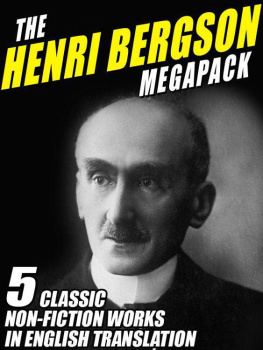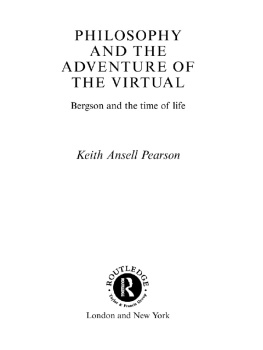LeRoy - A New Philosophy Henri Bergson
Here you can read online LeRoy - A New Philosophy Henri Bergson full text of the book (entire story) in english for free. Download pdf and epub, get meaning, cover and reviews about this ebook. genre: Science. Description of the work, (preface) as well as reviews are available. Best literature library LitArk.com created for fans of good reading and offers a wide selection of genres:
Romance novel
Science fiction
Adventure
Detective
Science
History
Home and family
Prose
Art
Politics
Computer
Non-fiction
Religion
Business
Children
Humor
Choose a favorite category and find really read worthwhile books. Enjoy immersion in the world of imagination, feel the emotions of the characters or learn something new for yourself, make an fascinating discovery.
A New Philosophy Henri Bergson: summary, description and annotation
We offer to read an annotation, description, summary or preface (depends on what the author of the book "A New Philosophy Henri Bergson" wrote himself). If you haven't found the necessary information about the book — write in the comments, we will try to find it.
LeRoy: author's other books
Who wrote A New Philosophy Henri Bergson? Find out the surname, the name of the author of the book and a list of all author's works by series.
A New Philosophy Henri Bergson — read online for free the complete book (whole text) full work
Below is the text of the book, divided by pages. System saving the place of the last page read, allows you to conveniently read the book "A New Philosophy Henri Bergson" online for free, without having to search again every time where you left off. Put a bookmark, and you can go to the page where you finished reading at any time.
Font size:
Interval:
Bookmark:
Project Gutenberg's A New Philosophy: Henri Bergson, by Edouard le Roy
This eBook is for the use of anyone anywhere at no cost and with
almost no restrictions whatsoever. You may copy it, give it away or
re-use it under the terms of the Project Gutenberg License included
with this eBook or online at www.gutenberg.org
Title: A New Philosophy: Henri Bergson
Author: Edouard le Roy
Translator: Vincent Benson
Release Date: August 13, 2008 [EBook #1347]
Language: English
*** START OF THIS PROJECT GUTENBERG EBOOK A NEW PHILOSOPHY: HENRI BERGSON ***
Produced by Sue Asscher, and David Widger
This little book is due to two articles published under the same title in the "Revue des Deux Mondes", 1st and 15th February 1912.
Their object was to present Mr Bergson's philosophy to the public at large, giving as short a sketch as possible, and describing, without too minute details, the general trend of his movement. These articles I have here reprinted intact. But I have added, in the form of continuous notes, some additional explanations on points which did not come within the scope of investigation in the original sketch.
I need hardly add that my work, though thus far complete, does not in any way claim to be a profound critical study. Indeed, such a study, dealing with a thinker who has not yet said his last word, would today be premature. I have simply aimed at writing an introduction which will make it easier to read and understand Mr Bergson's works, and serve as a preliminary guide to those who desire initiation in the new philosophy.
I have therefore firmly waived all the paraphernalia of technical discussions, and have made no comparisons, learned or otherwise, between Mr Bergson's teaching and that of older philosophies.
I can conceive no better method of misunderstanding the point at issue, I mean the simple unity of productive intuition, than that of pigeon-holing names of systems, collecting instances of resemblance, making up analogies, and specifying ingredients. An original philosophy is not meant to be studied as a mosaic which takes to pieces, a compound which analyses, or a body which dissects. On the contrary, it is by considering it as a living act, not as a rather clever discourse, by examining the peculiar excellence of its soul rather than the formation of its body, that the inquirer will succeed in understanding it. Properly speaking, I have only applied to Mr Bergson the method which he himself justifiably prescribes in a recent article ("Revue de Metaphysique et de Morale", November 1911), the only method, in fact, which is in all senses of the word fully "exact." I shall none the less be glad if these brief pages can be of any interest to professional philosophers, and have endeavoured, as far as possible, to allow them to trace, under the concise formulae employed, the scheme which I have refused to develop.
It has become evident to me that even today the interpretation of Mr Bergson's position is in many cases full of faults, which it would undoubtedly be worth while to assist in removing. I may or may not have succeeded in my attempt, but such, at any rate, is the precise end I had in view.
In conclusion, I may say that I have not had the honour of being Mr Bergson's pupil; and, at the time when I became acquainted with his outlook, my own direct reflection on science and life had already produced in me similar trains of thought. I found in his work the striking realisation of a presentiment and a desire. This "correspondence," which I have not exaggerated, proved at once a help and a hindrance to me in entering into the exact comprehension of so profoundly original a doctrine. The reader will thus understand that I think it in place to quote my authority to him in the following lines which Mr Bergson kindly wrote me after the publication of the articles reproduced in this volume: "Underneath and beyond the method you have caught the intention and the spirit...Your study could not be more conscientious or true to the original. As it advances, condensation increases in a marked degree: the reader becomes aware that the explanation is undergoing a progressive involution similar to the involution by which we determine the reality of Time. To produce this feeling, much more has been necessary than a close study of my works: it has required deep sympathy of thought, the power, in fact, of rethinking the subject in a personal and original manner. Nowhere is this sympathy more in evidence than in your concluding pages, where in a few words you point out the possibilities of further developments of the doctrine. In this direction I should myself say exactly what you have said."
Paris, 28th March 1912.
Preface GENERAL VIEW I. Method. II. Teaching. ADDITIONAL EXPLANATIONS I. Mr Bergson's Work and the General Directions of Contemporary Thought. II. Immediacy. III. Theory of Perception. IV. Critique of Language. V. The Problem of Consciousness. Duration and Liberty. VI. The Problem of Evolution: Life and Matter. VII. The Problem of Knowledge: Analysis and Intuition. VIII. Conclusion. Index. |
There is a thinker whose name is today on everybody's lips, who is deemed by acknowledged philosophers worthy of comparison with the greatest, and who, with his pen as well as his brain, has overleapt all technical obstacles, and won himself a reading both outside and inside the schools. Beyond any doubt, and by common consent, Mr Henri Bergson's work will appear to future eyes among the most characteristic, fertile, and glorious of our era. It marks a never-to-be-forgotten date in history; it opens up a phase of metaphysical thought; it lays down a principle of development the limits of which are indeterminable; and it is after cool consideration, with full consciousness of the exact value of words, that we are able to pronounce the revolution which it effects equal in importance to that effected by Kant, or even by Socrates.
Everybody, indeed, has become aware of this more or less clearly. Else how are we to explain, except through such recognition, the sudden striking spread of this new philosophy which, by its learned rigorism, precluded the likelihood of so rapid a triumph?
Twenty years have sufficed to make its results felt far beyond traditional limits: and now its influence is alive and working from one pole of thought to the other; and the active leaven contained in it can be seen already extending to the most varied and distant spheres: in social and political spheres, where from opposite points, and not without certain abuses, an attempt is already being made to wrench it in contrary directions; in the sphere of religious speculation, where it has been more legitimately summoned to a distinguished, illuminative, and beneficent career; in the sphere of pure science, where, despite old separatist prejudices, the ideas sown are pushing up here and there; and lastly, in the sphere of art, where there are indications that it is likely to help certain presentiments, which have till now remained obscure, to become conscious of themselves. The moment is favourable to a study of Mr Bergson's philosophy; but in the face of so many attempted methods of employment, some of them a trifle premature, the point of paramount importance, applying Mr Bergson's own method to himself, is to study his philosophy in itself, for itself, in its profound trend and its authenticated action, without claiming to enlist it in the ranks of any cause whatsoever.
Font size:
Interval:
Bookmark:
Similar books «A New Philosophy Henri Bergson»
Look at similar books to A New Philosophy Henri Bergson. We have selected literature similar in name and meaning in the hope of providing readers with more options to find new, interesting, not yet read works.
Discussion, reviews of the book A New Philosophy Henri Bergson and just readers' own opinions. Leave your comments, write what you think about the work, its meaning or the main characters. Specify what exactly you liked and what you didn't like, and why you think so.












